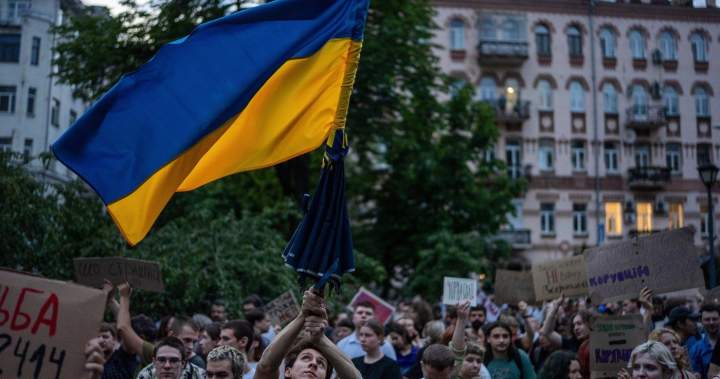I touched down in Kyiv last Tuesday under a metallic gray sky, the city’s familiar rhythm slightly off-kilter. Just hours earlier, thousands had gathered in front of Ukraine’s parliament, the Verkhovna Rada, their voices carrying across Hrushevsky Street in what has become the most significant domestic challenge to President Volodymyr Zelenskyy’s wartime leadership.
“We’ve fought for three years against Russian corruption and authoritarianism,” Oleksandra, a 34-year-old IT professional turned volunteer soldier, told me near Independence Square. “Why would we accept weakening our own anti-corruption infrastructure now?“
The demonstrators had rallied against a controversial bill that would give government officials the right to delay asset declarations for a year and potentially hide information about their finances from public scrutiny. Though seemingly technical, the legislation has touched a raw nerve in a society where corruption remains an existential concern – even amid the brutal Russian invasion.
By Wednesday afternoon, Zelenskyy had responded, calling for amendments to the bill after its initial passage. “I hear people’s concerns,” the president stated in a video address, promising to protect anti-corruption measures while balancing wartime security needs. But many protesters I spoke with remain deeply skeptical.
The roots of this controversy extend to Ukraine’s pre-war reform journey. Since the 2014 Maidan Revolution, the country has built an impressive anti-corruption architecture, including the National Agency on Corruption Prevention (NACP) and special anti-corruption courts. These institutions, while imperfect, represented Ukraine’s determined break from Soviet-era governance patterns that had enabled oligarchic control.
According to Transparency International’s 2023 Corruption Perceptions Index, Ukraine has improved its ranking in recent years but still places 104th out of 180 countries. Progress, but far from the European standards the country aspires to as it pursues EU membership.
“Every Ukrainian understands that corruption costs lives on the frontlines,” explained Daria Kaleniuk, executive director of the Anti-Corruption Action Center, when we met at a café near the protest site. “When someone steals money meant for drones or ammunition, soldiers die. It’s that direct.”
The proposed legislation would modify Ukraine’s asset declaration system by allowing officials to delay reporting requirements and limiting public access to the data. Government supporters argue these changes protect sensitive information during wartime. Critics counter that they create dangerous opacity precisely when billions in international aid flow through government channels.
Walking through central Kyiv, past buildings protected by sandbags and anti-tank barriers, the complexity of Ukraine’s position becomes visceral. Air raid sirens periodically interrupt daily life while the society simultaneously fights for its democratic future. This duality defines today’s Ukraine – defending itself militarily while refusing to abandon aspirations for European-style governance.
The European Union has made its position clear. “Continued commitment to anti-corruption measures remains essential,” stated European Commission spokesperson Ana Pisonero last week, emphasizing that strong anti-corruption infrastructure represents a key condition for Ukraine’s EU membership path.
Zelenskyy’s presidency was built on anti-corruption promises. His fictional role as a teacher-turned-president who fought corruption in the TV series “Servant of the People” helped propel him to actual political leadership in 2019. This background makes the current tension particularly poignant for many Ukrainians.
“Before the full-scale invasion, we would have seen much larger protests,” political analyst Volodymyr Fesenko told me. “The fact that people are willing to demonstrate during wartime shows how deeply Ukrainians care about these issues.”
The Ukrainian parliament is now expected to revise the legislation. How this conflict resolves will signify much about Ukraine’s governance trajectory during an existential war. Western donors, who have committed over $100 billion in military and humanitarian aid, are watching closely.
For ordinary Ukrainians, the stakes transcend politics. Near Kyiv’s central train station, I met Mykola, a 56-year-old volunteer helping distribute humanitarian supplies. “We’re fighting two wars simultaneously,” he said, adjusting his worn jacket. “One against Russian missiles, another against the corruption that has held us back for decades. We cannot afford to lose either.“
As I departed Ukraine yesterday, the air raid sirens wailed again over Kyiv. But beneath the immediate danger of Russian attacks lies a profound societal determination – not just to survive this war, but to emerge from it as the democratic, transparent European nation that motivated the Maidan protesters a decade ago.
The anti-corruption demonstrations remind us that even amid devastating conflict, Ukrainians refuse to sacrifice the values they’re fighting to protect. Their struggle against corruption represents not a distraction from the war effort, but its essential companion – a fight for the kind of Ukraine worth defending with their lives.






